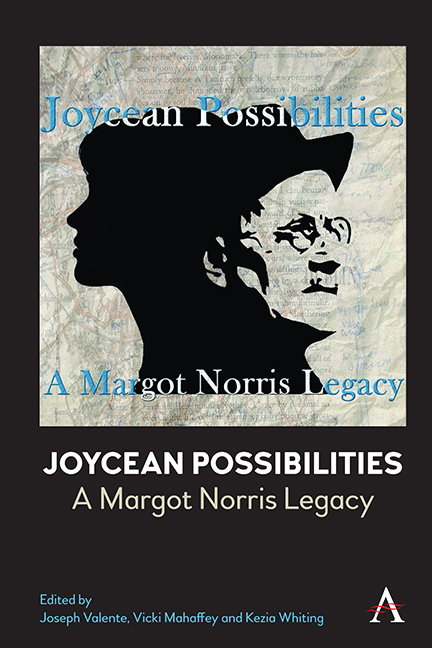11 - Always A Good Turn: Veterans of The Jewish Subject in Joyce
Published online by Cambridge University Press: 20 April 2024
Summary
One of my first memories of Margot Norris is of her plenary address at the Copenhagen Joyce Symposium, in 1986, in which, as in the article it became, she tracks “the riddle of desire” through the overdetermined helio-trope. That the upward movement of the figure is not always uplifting corresponds to her critical sensibility—a light narratological touch with an exquisitely sharp edge. Another essay I invariably return to in teaching “The Dead” is Norris's essay on “back-answers,” where she mobilizes (Althusserian) ideas of relative autonomy and Lacanian theories governing desire to make a claim for the narrative's canny and uncanny use of suspect ideological propositions: as she describes it, “Joyce's dramatization of the politics of art's determination to conceal its own politically oppressive functions.”1 Her topic there is gender, in particular, but she continues to demonstrate the sometimes tricky balance between complicity and exposure in the subjects Joyce treats. In her Introduction to Suspicious Readings of Joyce's Dubliners (2003) (the volume in which that essay on “The Dead” has finally been collected), Margot refers to herself as a “bricoleur, taking this or that tool as it comes to hand and as it fits the purpose of reading whatever story is before” her. She elaborates: “my theoretical inspirations […] have in common an oppositional, or dialectical, or dialogical logic that I find necessary for reading the stories otherwise rather than simply as reinforcements or paraphrases of the narrations themselves.”2 In approaching Joycean texts in these ways, Dubliners in particular, she posits the “problem” of multiple interpretations as both generous and intolerably ambiguous. Margot Norris talks about how she herself may be intolerant of such ambiguity, coming down on one side or another in her readings, but acknowledges the ethical stance in such toleration (e.g., Derek Attridge's refusal to fill in the gaps in reading for Clay, for example, in order to respect the other as other), and, at the same time, the ethical challenge to being a detective, enthralled still by the search for answers.3 As Margot Norris's readers, we thrill in her search.
- Type
- Chapter
- Information
- Joycean PossibilitiesA Margot Norris Legacy, pp. 159 - 174Publisher: Anthem PressPrint publication year: 2022

